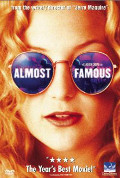
Directed by
Cameron Crowe
122 minutes
Rated MA
Reviewed by
Bernard Hemingway

Almost Famous
Synopsis: The adventures of mild-mannered 15 year old would-be rock journalist, William Miller (Patrick Fugit), following a hairy mid-level rock n'roll band, Stillwater, on their 1973 bus tour of America. Along the way he is befriended by "band-aid" Penny Lane (Kate Hudson).
The world of sex'n' drugs'n' rock'n'roll offers vicarious delights for those constrained by more conservative lifestyles. The trouble with rock'n'roll as cinematic subject matter is that it is largely an inconsequential activity perpetrated by rather dim-witted people, albeit with pretensions to significance. Hence it is well-suited to the mockumentary approach, one which delights in the behind-the-scenes pisstake (compare Crowe's 1992 film, Singles, in which the fictional band here, Stillwater, appears as a support for Matt Dillon's band there). Almost Famous mixes this genre with some coming-of-age/romantic comedy story elements which, when combined with the 70's pop/rocksoundtrack, make for a mildly entertaining, albeit ultimately forgettable, mainstream package which was a huge commercial success in its day,.Although it won a Golden Globe for Best Musical or Comedy and has been critically well-received, don't expect to see anything new. If you liked last year's vinyl-fetishizing hit High Fidelity you may like this, as it has many elements in common, reworked for a younger demographic (the two central characters, Penny and William are 16 and 15).
Writer/director Crowe is often derivative in style and far from a perfectionist and, somewhat of a patchwork, Almost Famous tends to have strong points and weak points rather than a consistent quality for better or worse. After a very slow introduction, the longish storyline rambles episodically through a series of events which were sometimes funny (Russell's acid trip) and sometimes mawkishly clichéd (William chasing Penny's departing plane). The dialogue is sometimes snappy ("Rock-stars have kidnapped my son.") and sometimes heavy-handed (the name of virtually every early 70s stadium rock band/star must have been mentioned along the way) and despite the careful attention to period style, particularly in costume design, and the evident fact that this is based on the experiences of someone who lived though the time (Crowe was himself the model for the William character), the film does not capture the out-there atmosphere of the era.
Once out of the prologue establishing his protagonist’s back story and into his rock n’ roll experiences, Crowe is unable to present anything of interest, his film simply raking back and forth between its main elements of the fraught dynamics of the obviously not-a-real-band band (whose songs were written by Peter Frampton), the unstable relationship between the lead guitarist (Billy Crudup) and a groupie Penny Lane, with whom William falls in love, and the recurring presence of his clinging mother (Frances McDormand).
Whilst the performances are mainly solid (well, Noah Taylor is Noah Taylor), if there was one outstanding strength, for me it was Frances McDormand as William's mother, the strong-willed, over-anxious and very articulate single mother fearing her fledgling son being swept away on a historical tide of drug-drenched promiscuity. On the other hand I wished I had a big cream pie to slap in the face of Kate Hudson (who won Best Supporting Actress at the Golden Globes for her role). Looking like Goldie Hawn hybridized with someone else (which she literally is) she does nothing other than smile (or cry) photogenically to the camera (one should really blame Crowe for this). One should also mention Philip Seymour Hoffman who, as legendary rock journo Lester Bangs, provides a tinge of darkness in a sea of blandness. And that is probably the greatest weakness of the film - it's simply too nice to be true.
The enormous success of Almost Famous is largely attributable to audience investment in rock music mythology, well oiled by an eclectic soundtrack ($3.5m was spent on music rights) and neatly packaged in sanitized Hollywood wrapping (the film was released by Dreamworks). In this respect credit must go to Crowe for the scene on the tour bus when everyone joins in singing along to Elton John’s “Tiny Dancer”. It captures the sentimental power of great pop music perfectly. Unfortunately, it's nearly as incongruous as the scene in which Penny Lane has her stomach pumped to the tune of Stevie Wonder's "Ma Cherie".
Want something different?





